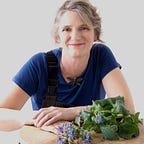CPP: Biodynamics for Beginners
The Biodynamic Cow Pat Pit Preparation
I’m interested in exploring biodynamics in my gardening, where should I begin?
-from a Blue Borage Instagram follower
I think depending on who you ask, you would get dozens of answers to this question.
I have a handful of responses, depending on the kind of person I’m talking to. It often depends on whether or not I’ve seen their garden and had a chance to feel for myself what I would do next in that space.
On the whole it’s a tricky question to answer, as I feel like people sometimes want to simplify something that is incredibly deep and complex.
Some possible starting places are:
- Go visit a Demeter certified biodynamic grower and spend a day working with the soil — does anything speak to you or spark fascination?
- Find your favourite plant and sit with it each day: draw it (or take photos), taste it (if it’s an edible herb or vegetable), let it communicate what it wants from you.
- Meditate: there are so many paths into anthroposophical meditation, but just sitting in the garden with a cup of tea and no phone for 15 minutes probably counts. Feel the air quality, notice the expression of the season, and let your breathing slow down to an ‘earth’ pace.
- BD500: the horn manure preparation. This is probably the most common starting point, and where I began. It’s nice to do this in a group, find someone stirring in your area and go along with a bucket to stir with them.
- Make a biodynamic hot compost pile, and add the biodynamic compost preparations.
- CPP: the Cow Pat Pit preparation. This is my most common answer to the ‘where do I start’ question. It’s a relatively quick process — just 20 minutes of stirring. It’s also the kind of thing you can do anytime: I use it with all my seedlings whenever they get transplanted and am 100% sure it lessens transplant shock.
What is CPP?
Put simply, it’s cow manure which is mixed with a little crushed egg shell, some volcanic rock dust, kneaded for an hour, and then has the six Biodynamic compost preparations added to it: yarrow, chamomile, stinging nettle, oak bark, dandelion and valerian. Traditionally this is stored in a brick-lined pit in the ground for a few months where it transforms from fresh manure into fine humus containing all the goodness of the compost preparations.
How do I use the CPP?
To use the CPP, you take a small handful and mix it in a bucket of warmed up rain water. Stir the mixture to create a vortex, like a whirlpool effect, and then change the direction of stirring to create a vortex going the other way. Repeat this backwards and forwards stirring action, alternating between creating order and then disrupting with chaos.
After 15–20 minutes you can then use the liquid over your garden, your seedlings, your lawn, and even your houseplants.
It’s a fabulous way to promote soil health, and for newcomers to Biodynamics it’s a nice way to start making your own preparations. If you don’t have bricks to make a pit, experiment with different sized terracotta pots, and dig them into a free draining section of your garden. You want the mixture to be able to breathe, but to not get rained on — I use a terracotta saucer over the top of the terracotta pot.
If you want to try it before you make it, then I’d recommend joining the Biodynamic Association where you live, and sourcing some from a preparation maker in your local area.
For other tips on incorporating biodynamics into your home gardening, here’s another perspective.
Happy stirring!
Katrina🌱
Ideas for innovative edible gardening solutions using biodynamic methods to make ‘soil with soul’ is what New Zealand needs right now. For tips, advice and online courses go to www.blueborage.co.nz or get in touch by email at katrina@blueborage.co.nz
